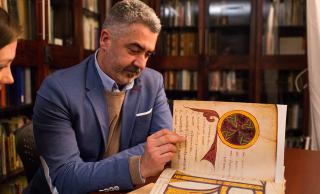Research in focus: Maryam S. Mirian
Learn more about the work of our researchers at UBC

June 28, 2021
Name:
Maryam S. Mirian
My pronouns:
she/her
Title:
Research Associate
Department/Unit:
Medicine (Djavad Mowafaghian Centre for Brain Health)
Location:
Vancouver
What year did you start working at UBC?
2014
Provide an overview of your research in 75 words or less:
As a Machine Learning (ML) scientist, I am currently studying the brain and behavioural data recorded from people with Parkinson's Disease to help neurologists explore how the disorder affects ongoing brain activity during motor tasks, at rest, and in sleep. The ultimate goal is to try and “normalize” brain activity via a new method of non-invasive brain stimulation. This will provide a safe, novel treatment for Parkinson's disease (PD), and possibly other diseases as well.
What first motivated you (or motivates you) to conduct your research?
I thoroughly enjoy using my expertise in a field that is beneficial to my community and perhaps, if possible, even a more wide-ranging array of people. This research adds purpose and joy to my daily life. It is astounding how one can make sense of biomedical data for clinicians and facilitate their decision-making.
What do you hope will change as a result of this research?
We anticipate that if we can customize the brain stimulation for each patient (based on analysis of their ongoing brain activity), there will be a substantial improvement in PD symptoms. We also believe it may be possible to target different aspects of the disease with this type of customization, including those symptoms that are not currently well-managed (e.g. postural drops in blood pressure, impaired cognition).
Are there any research collaborators you’d like to acknowledge and why?
My work is part of an ongoing collaborative project involving both clinicians and engineers. The PI of this project, Dr. Martin McKeown, has knowledge and experience as both an engineer and a Parkinson’s neurologist. I believe a major reason for the success of this research program is the PI’s ability to harmonize the complementary skills of all parties.
What have you learned during your research that has surprised you the most?
One aspect of our research has been trying to determine how current brain rhythms can predict future behaviour. As part of this, we learned that even before one starts to move, brain rhythms can fairly accurately predict how fast he/she will ultimately move. I think this very statement may challenge the concept of free will.
- Our people
- Research
- Research in focus






